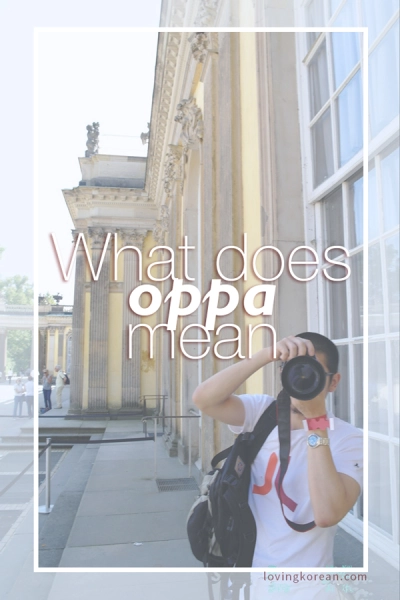
In Korean oppa (오빠) literally means “older brother of a female person”, but the meaning of oppa changed over time and now can refer to female person’s
- older brother,
- very close friend who is older (but not much older!),
- romantic interest, boyfriend, and sometimes even husband, if they are older.
Addressing other people in Korean language is never simple. To truly understand the meaning of the word oppa and know when it is appropriate to use it, you must understand a bit about Korean culture.
For Koreans, it is really important to observe the relationship between the speaker and the subject of the sentence and the speaker and the audience. That’s just a fancy way to say you must be careful who you are speaking about and who is listening. That sounds paranoid, haha, but it’s actually all about showing respect to those with higher status than you.
And who has higher status?
Anyone in your family who is older than you, any stranger of equal or greater age, employer, customer, teacher, etc.
If a person holds superior status to you, whether by age, or function at a company or rank in the military, you should never use their name or say “you”. You need to use honorific titles, one of which is oppa.
Who can I call oppa?
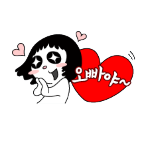
See more Korean emoji
You can say oppa ONLY to an older male. Older person is anyone who was born in the year prior to the year of your birth. So, even if he is a few months older, but born in the same year* as you, he is not oppa – meaning, while you are free to say what you want, you won’t be using that word properly.
If you are the same age you might call each other chingu (친구), if you are older you are nuna (누나) to him.
The upper limit on the age difference between you and oppa would be roughly 10 years. If someone is more than 10 years older than you then you would use a different title to refer to them. Also, it can be strange calling men over a certain age oppa. That age is not strictly defined, but probably somewhere over 30.
And most importantly, you have to be close to that person. Don’t say oppa in an official or businesses settings.
*Sometimes, some people use the Lunar calendar, or year of starting school if they are students, but this is rare and I’ve seen Koreans get confused over this too.
How to write oppa in Korean Hangul
To write 오빠 by hand, start at the top of the circle and move counter-clockwise. Follow the movements as shown in the animation below. Be sure to match the stroke order to make letters look more natural, the way native Koreans write them.
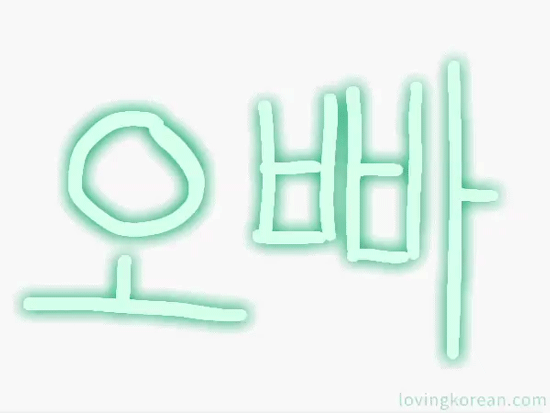
I suggest you learn how to write whole Korean alphabet Hangul, not just the word oppa. It will only take a few hours to learn the basics, and you will instantly know how to write much more than oppa. Most importantly, you will understand what you are writing, not just mindlessly copying lines.
If you want to type oppa on Korean keyboard press ㅇ ㅗ ㅃ ㅏ one after the other (depending on the keyboard you use you may have to press SHIFT + ㅂ to get ㅃ.)
I wrote a lot about setting up Korean keyboard on different devices and showed Korean keyboard layout so if you have Android or iOS try this, I like MoAKey for Android as well, and also check out how to set up Korean keyboard on Windows 10.
How to pronounce oppa?
Using IPA (International Phonetic Alphabet) the sounds would be represented as [op̕a]. If you are not familiar with IPA you can hear correct Korean pronunciation of oppa on Naver dictionary by pressing the speaker icon. The most important point you need to pay attention to in order to pronounce oppa correctly would probably be tensing your throat at the “pp” sound (note that you don’t say p twice, it’s just double to remind you of this tensing).
If you want to get your pronunciation just right check out the best Korean pronunciation textbook reviews.
Why do Korean guys like to be called oppa?
Even though calling a guy oppa can be no more exciting than calling an older woman ajumma, if said with the right tone of voice, it indicates that you like a guy as more than just a friend. And who doesn’t like being liked? It’s flirtatious, and flirting is usually exciting.
That being said, not all Korean guys like being called oppa. Some don’t care, some actively dislike it. If you are close enough to a guy to call him oppa, you are close enough to ask him if he likes it.
Do Korean guys dislike when non-Korean girls call them oppa?
Some Korean guys say ‘yes’ some say ‘no’. But I believe it’s not that simple. It all depends on the intent. First, realize that word itself doesn’t have any magical powers. The magic comes from the person using it. If a foreign girl is going around squealing oppa at every guy she barely knows I can see how that can be a turnoff. But if you wait until you develop a more intimate relationship, and use it sincerely, I’m sure the guy would be pleasantly surprised.
I rarely use oppa with Kimchi Man. It just sounds unnatural to throw in a random Korean word when speaking English. But once I start speaking Korean with my boyfriend (and hopefully that will be before he becomes ajusshi) I would probably naturally switch to calling him oppa.
Does oppa mean boyfriend?
Oppa doesn’t mean boyfriend. A three-year-old girl can call her four-year-old brother oppa. Oppa meaning boyfriend would of course make that situation impossible.
Korean word for a boyfriend is 남자친구 (rom. nam-ja-chin-gu IPA namdzatsʰingu). 남자 means man and 친구 means friend so it’s similar to English, except it’s more adult-sounding “manfriend” rather than “boyfriend”. However, oppa indeed is a word one can use to call and refer to their boyfriend, it just doesn’t mean boyfriend.
Can guys say oppa?
Not in public ;)
An equivalent to oppa for guys would be
• 형 (rom. hyeong; IPA [hyʌŋ]) male person referring to an older male person
• 누나 (rom. nu-na; IPA [nuna]) male person referring to an older female person
Since 형 is a very commonly used word it retained its older romanized form hyung even though its official romanization now is hyeong.
I have already been Kimchi Man’s girlfriend for a few weeks when I realized I don’t know his parents’ names! Feeling like a bad girlfriend, I asked him what their names were. Instead of an answer I just got a few grunts and then silence. Thinking he didn’t understand, which is not a rare occurrence considering neither of us is a native speaker of English, I asked again.
Silence.
After more prodding, I finally realized what the problem was. And it wasn’t until I explained that I would just like to have that as an information and promised never to say their name in front of them, that he finally told me their names.
And if that is not curious enough, I recently read an article stating that there used to be women in Korean villages who didn’t even know their own names! All their lives they had been called sister, daughter, Ms., mother, wife, and they never needed to use their names.
Even if you don’t speak Korean, if you have watched Korean dramas you are probably already familiar with some of these terms: hyung (hyeong), ajusshi (ajeossi), ajumma (ajuma), seonsaengnim, noona, sunbae (seonbae)… Everyone has their title.
Did you know that ajusshi and ajumma used to be terms reserved just for family, meaning aunt and uncle? Well, same thing happened with the definition of oppa: it used to be exclusively a family term meaning older brother, but its meaning expanded to mean an unrelated older male who you have somewhat close relationship with. What it hasn’t changed is implied respect and superiority of the person you are addressing, and that is something most non-Korean women using this term don’t understand.
(Note that orabeoni (오라버니) is an honorific form of oppa (오빠) and orabeonim (오라버님) an even higher honorific. One usually refers to one’s own brother as orabeoni and other people’s brother as orabeonim. I only ever heard these used in Korean historical dramas known as sageuks (사극))
It also implies that, while you in the position of showing respect and deference, even a level of trust, oppa is in the position where he should protect you and take care of you. This is also important to remember, as some women might be uncomfortable with this power-dynamic.
Still, human relationships are complex, and sometimes a word is just a word. It’s possible to agree to call someone oppa if you’re not female, if they’re not male, if you’re not younger and so on, but it’s good to know Korean culture and why Koreans say oppa in a certain situation. There is a culturally agreed upon meaning.
And how do you say oppa in English?
Sometimes things can’t be translated from one language to another, just explained. English does not have an equivalent word, and it certainly does not have Korean social structure that would give rise to such words.
And if you ever catch yourself thinking it’s strange to use the same word to refer to one’s older brother and boyfriend, just think how strange it is to use the same word for a newborn human and romantic partner. “Baby”.
And that’s all you need to know to give a correct translation of oppa.
People who like this post also like:

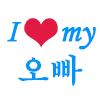
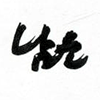


Comment (you DON’T need to fill in e-mail address)